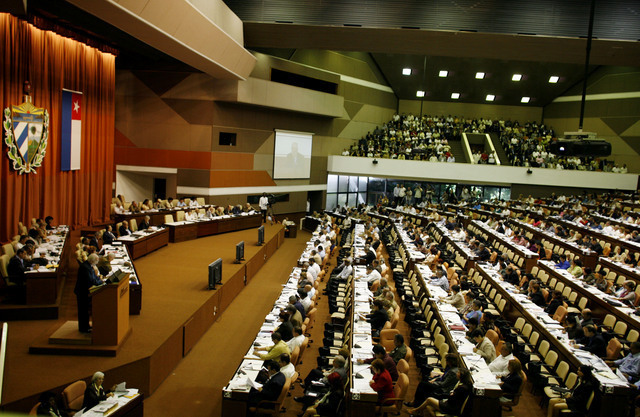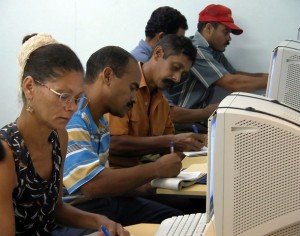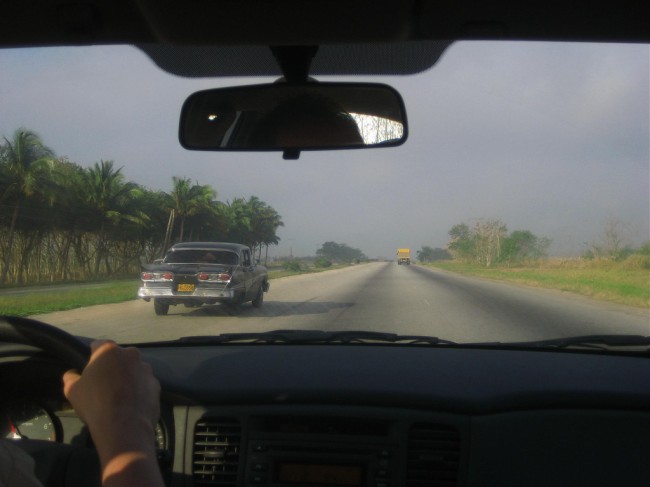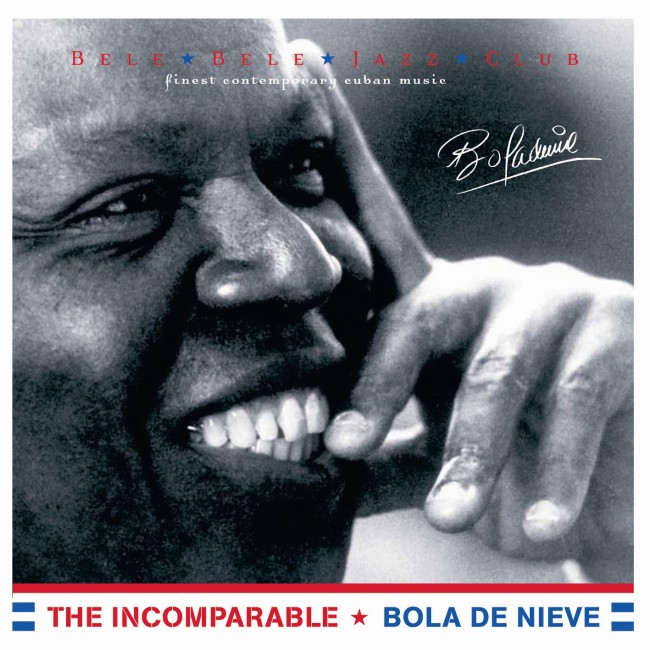For more information about this series of posts, please click here.
From “The New Man”
Dear comrades, close comrades,
Those who now warn us, memorializing the life and work of Papito, Pavón and Quesada, instead of ridiculing them as flunkies, or treating them as model sacrificial snitches from a gray period of our history, should raise a monument to them, the highest.
Because those who vent against them today, in the name of our moral purity that, don’t forget, is also unreal, also epic, if they have any glory, that which they say fits into a grain of sand, they owe it to them.
Neither the most vigorous combatant nor the most ferocious adversary has contributed so exactly disproportionately to my creation than Papito, Pavón and Quesada, who, with their dauntless imprint, converted me into the most perfect historical construction of the people.
I am the most exact result of this now excessive dialectic process of the middle century. And when I say “dialectic,” I’m referring to the custom derived from the contradiction, the struggle of opposites, antagonistic or not, although preferably of the first, the most drastic conservatives, because with their defeat they make irreversible the evolutionary, historic processes, creating the collective conscience that sweeps them away from the future, to not be negative examples, unrepeatable, although irreversible,
Papito, Pavón and Quesada are, without a doubt, part of this pattern. But also those who inject a memory of the institutionalized terrorism, at the state level, the mistrust (mutual and self), the paranoia, the fear of the Other (whether it’s myself, my tortured conscience), that which is not (in so far as being ontological, that’s good, but fundamentally ideological) the same as I, someone similar. The fear of otherness (Jiminy Cricket, leading you on the right road) was not aroused or undone with/by the dirty work (hidden, secret, clandestine) of Papito, Pavón and Quesada, but above and beyond their “Five-Year Gray Period” it extends, was extended and – if we don’t do something today – will be extended, as it menaced with all awareness and allusive capacity, poetic, let’s say, from the “small screen”, the administrators of our power.
Yes, Gray Period paranoia aside, it’s frightening to see that, when they were buried they managed to (dis)simulate themselves in the tomb, where some of us go to lie, to create unarmed defenseless, specimens that appear (we might wish) extinct, they emerge from the silent obscurity of forgetfulness, upon emerging from the back of the small screen (that’s to say from banality, nothingness or The Difference, which is the summit), as a sample demonstration of media proof. Papito, Pavón and Quesada have complied with the cause to which one day they swore to dedicate themselves, subordinate their lives for, at all cost, repressing them, extolling values, contrasting them, excluding them. Omission doesn’t work, not even with them.
Those who saw them on TV comment that, simply seen and not doubting it, I add, they didn’t seem repentant, one of them even said that nothing tortured his conscience. They gave no indication of reviewing their bad steps, those who from their intrepid trenches of mistaken ideas, intolerance and premeditated errors, some treacherous or coldly calculated (while drinking cold beer, on the Patio of the Cathedral, according to what they tell me), working overtime into the wee hours with the delight of a goldsmith, gave me the master touch, the finish.
It’s not paradoxical to say that with their excesses Papito, Pavón and Quesdad stopped delineating at least my contours, extracting me from the utopia of that time, up to achieving what I am now, or we are. In their eagerness, in order to accomplish unthinkable renovations, in a process of reaching the high dream of being a different human, united in solidarity, utilizing the method of standardizing society, they contrasted it so much that they opposed me, at least like a paradigm, trying to institutionalize in place of man until then sacrificed, worker, conscious of his revolutionary role, that I was blindly obedient, which formerly giving one’s all for an ideal accepts as good constitutional violations, the alienation, disposal of human rights and the installation of dogmas and prejudices, the most diverse exclusions like rational, honorable, and valid social behaviors.
So that I, the idealized, monotonous, intangible new man, after passing through the filters of the numerous Papitos, Pavones and Quesadas, generalized in every social sphere of the “Five-Year Gray Period,” have materialized into the youth and adults of today: writers of merit (whether they’re gay or not, who cares anymore), obscure musicians of the music stand, or precious stones in tune with April, modern dancers or not so much, Moorish boleristas or Mountain-man soneros, half sorghum or full sorghum, drunken or blurred jugglers, broke or with cash, with trim haircuts with little lines shaved into the sides, mop-hairs initiated into Santeria, protestant christians, salty, with too much on their plate or salty, with no plate at all, plumbers, bricklayers, shoemakers working (for themselves or on the black market), painters of little boats, escapees on a raft, bakers without oil, deserters of salsa, those of the rains-on-roofs or even though you know that later you’ll be going, improvisational singers of desperate rural music, ex-cane cutters, we give them posts and we relieve posts, the thieves on the bus, the transvestites of Reina and other artists, because we are all them, we have to make art or crafts under certain circumstances called “special,” which during that “Five-Year Gray Period” – which has not died out, like a good fire provoked – converted them into their appeasing victims or systematic opposition, many of them equally broken and not claimed…
In the end, at the vertical level of our society, all owe it, we all owe who we are to the “Five-Year Gray Period”, when by virtue of the laws like those of vagrancy, the centers of work converted themselves, instead of centers of material production with the goal of benefiting the people, into centers of inflated production, subjective, abstract, of rehabilitation.
Yes, we, the new or repaired men of today, if we apply to everyone the double standard that we owe to the Papitos, Pavones and Quesadas and company (they weren’t working alone, of course, they had lackeys and even figureheads, so as not to say hit men), all the dignity that now they proclaim, we proclaim, a proclamation coming from the e-mails that we interchange, with no little hope of victory, which we are owed, in place of ridiculing them (inquisitorial manner of saying “skinning” them) or putting them again on the public pillory or pouring on them so much earth that they appear dead, to show them our most profound recognition, and raise them to the highest peak of Mt. Turquino, of The Havana Libre Hotel, an unforgettable monument to tedium, with one entry per turn and for heterosexual couples, of course, as God ordered in the ’70s, but paying the hardy cover in Convertible Cuban Pesos, the same as now, in these years of 2000, just as God has decreed that we all pay.
Sincere greetings from
The New Man
Translated by Regina Anavy and Los Iguanitos
January 31, 2007



 People on the street in Cuba look sideways at the recent reforms designed for the impoverished national economy. Few are counting on these changes put forward by president Raúl Castro. They don’t believe they will make the country function more efficiently.
People on the street in Cuba look sideways at the recent reforms designed for the impoverished national economy. Few are counting on these changes put forward by president Raúl Castro. They don’t believe they will make the country function more efficiently.

 Dania Virgen García is a journalist like Usaín Bolt is a cosmonaut.
Dania Virgen García is a journalist like Usaín Bolt is a cosmonaut. No one counted on him. He was a person who accommodated the political mandarins. Cardinal Jaime Ortega Alamino, the Archbishop of Havana, had just left the local parish.
No one counted on him. He was a person who accommodated the political mandarins. Cardinal Jaime Ortega Alamino, the Archbishop of Havana, had just left the local parish.
 Clara Fuentes, 39-years-old, was never very bright. She was a headstrong girl, raised in a small house of 15 meters without bathrooms or drinking water. Her father was a zombie-like sign painter; most days he was on strike, trying to scare up some money to raise his two daughters.
Clara Fuentes, 39-years-old, was never very bright. She was a headstrong girl, raised in a small house of 15 meters without bathrooms or drinking water. Her father was a zombie-like sign painter; most days he was on strike, trying to scare up some money to raise his two daughters.


